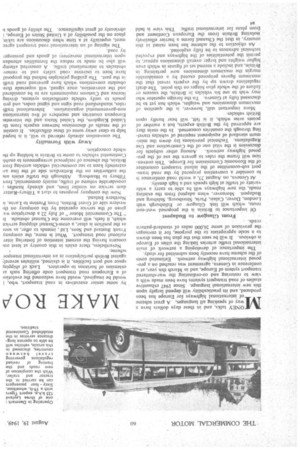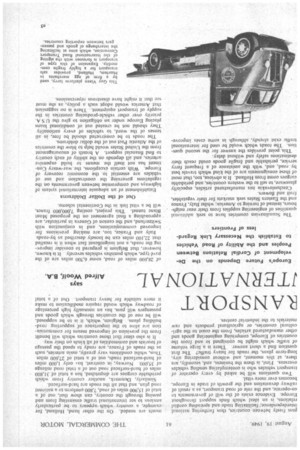MAKE ROP kANSPORT ITERNATIONAL
Page 38

Page 39

If you've noticed an error in this article please click here to report it so we can fix it.
says Alfred Woolf, B.A.
Europe's Future Depends on the Development of Cordial Relations Between Peoples and the Ability of Road Vehicles to Establish the Necessary Link Regard less of Frontiers
MONEY talks, and in these days dollars have a way of speaking all languages, A great scheme of international highways for Europe has been produced, and its practicability will depend largely upon this new international language. Since 1947 exhaustive studies of road transport systems have been made with a view to restoring and co-ordinating the war-shattered transport system of Europe, and in March this year, at a conference in Geneva, agreement was reached on a proposed international highway network. Estimated costs of the scheme have recently been submitted for study.
The importance of developing a network of main international traffic arteries linking the cities of Europe is obvious. It will be seen that the plan has been drawn to a scale appropriate to the purpose, for it envisages the provision of some 26,000 miles of standard-pattern reads. , From Glasgow to Budapest
Of importance to Britain is the proposed west-east route, which will link Glasgow or Edinburgh with London, Dover, Calais, Paris, Strasbourg, Salsburg and Budapest. Moreover, when adapted from the existing roads, the new highways will be able to carry a wide variety of traffic at high speeds and a high density.
At Geneva, on August 23, a world road conference is to consider a convention prepared by the road transport sub-committee of the inland transport committee of the Economic Commission for Europe. This convention will frame the rules to govern the use of the proposed highway network. Among other subjects for discussion is the vital one of the Construction and Use Regulations. Technical provisions lay down the minimum standard of equiprrtent required of vehicles travelling through the countries concerned. In the main they are approved by the British experts, but a number of points arise which, it is felt, will bear hardly upon British vehicles More important still, however, is the question of maximum dimensions and weights, which has yet to be discussed fully at Geneva. To the foreign operator who may wish to use his vehicles in Britain, the success or failure of the whole plan hinges on this point. The draft regulations drawn up by the experts reveal that the maximum figures proposed exceed by a considerable margin the maximum dimensions now pertaining in Britain, and include a second set of figures in which even higher weights and larger overall dimensions appear, to permit the potentialities of the highways and expected technical advances to be fully exploited.
An objection to the scheme has been raised in this country, in that the Channel forms a barrier effectively isolating Britain from the European Continent and from plans for international traffic This view is held
B4
by some senior executives in road transport, who, i would be imagined, would have welcomed the evolutim of a European road transport 'code offering such am
extension of horizons to operators. Lack of shipping space and port facilities, it is claimed, militates severel! against British participation in an international transpor scheme.
Nevertheless,. there exists in this country at least on concern having the earnest intention of fostering inter national road transport. What is more, the company Frank Bustard and Sons, Ltd, intends to offer, as soot as the position is clear, a cross-Channel shipping service which, it feels, will overcome the Channel obstacle. Jr "The Commercial Motor of July 22 a description wa given of the service operated by the company on till western side of Great Britain, from Preston to Larne, it Northern Ireland.
Now the company proposes to start a Tilbury-Rotter darn service on similar lines, and already handles considerable volume of traffic, mainly commercial, fron Tilbury to Hamburg. Although the traffic exists an the authorities on the Rotterdam side of the line an extremely keen to see commercial vehicles arriving fron Britain, the absence of reciprocal arrangements to enahli Continental vehicles to come to Britain is holding up thi whole conception.
Away with Formality The convention already referred to will, it is hoped help to clear away some of these difficulties. It consist of the results of discussions between experts from fill United Kingdom, the United States and the interestei European countries and members of five internationa non-governmental organizations. International traffi, rules, standardized road signs and signal codes, and pro posals to unify vehicle certification systems, driving licence and Customs requirements are to be considered and the convention, once signed, will supersede thre obsolete conventions which have governed road traffi in the past. The guiding principles behind the proposal have been to increase load safety and to remov obstacles to international traffic. A concerted attemp will also be made to reduce the formalities attendan upon international mov.erneni of goods and passenger by road.
The signing of an international-road transport agree ment, especially at a time When discussions are takin, place on the possibility of a United States of Europe, i obviously of great significance. The ability of goods ti
pass freely between countries, thus furthering national interdependence; facilitating thade and spreading cordial relations, is an ideal which finds support throughout Europe. Evidenee exists of the will of governments to co-operate, and the role of road transport, as a result of railway devastation and the growth of trade in Europe, becomes ever more vital.
Two questions will be asked by every operator of transport vehicles who is contemplating sending vehicles overseas. First, is there the business, and, secondly, are there, at this moment, and without considering airy, long-term plans, the roads for heavy traffic? The first question find a short answer. There is a large volume of traffic which might be consigned to and from the countries of Europe, comprising engineering goods and other manufactured articles, from the coast to the agricultural countries, or agricultural products and raw materials to the industrial centres.
The Scandinavian countries have to seek additional quantities of engineering supplies from their near neighbours, instead of turning to America; whilst Italy, France and the Eastern States seek markets for their vegetables, fruit and flowers.
Czechoslovakia has manufactured articles, especially glassware, to sell to the western countries, and perishable cargoes come from Holland. It is obvious, too, that most of these consignments are of the kind which travels best by road, and,' with the assistance of a frequent ferry service, perishable and fragile goods could reach their destinations safely and without delay.
• This point provides the answer for the second question. The roads which would. be used for international traffic exist already, although in some cases improve merits are needed. On the other hand, Holland, for exaMple, a country which •appear to be particularly anxious to see international traffic emanating from and passing through the country, can show that, out of a total of 15,900 miles of road, 7,800 conform to a national road plan, and that all the roads are hard-surfaced.
Similarly, Denmark, another country from which perishable Cargoes are dispatched, has a total of 3100 miles of hard-surfaced road out of a total road mileage of 35,000. Norway, in contrast, has only 1,000 miles of hard-surfaced roads, out of a total of 27,600 miles. Thus, whilst conditions vary greatly, main arteries, such as the roads of France, are ready to speed the passage of .tourists and comthodities of all kinds on their way, It is also clear that those countries which will benefit from the proviSion of improved means for communication are alive to the importance of supporting roadbuilding plans. Belgiurn, which, it is to be supposed, will be one of the countries through which goods and passengers will pass, has an unusually high percentage of roadway which would require modification to make it more suitable for heavy transport. Out of. a total
of 28,800 miles of road, some 6,700 miles are of the pave type, which punishes vehicles severely, It is known, however, that Belgium is prepared to consider improving the roads, a not insignificant fact when it is recalled that 22,100 miles can be loosely described as by-roads.
Italy and Frarice, too, are making provisions for improved commuoications, and in conjunction with Switzerland, and the canton of Geneva in particular, are approaching a final agreement on the proposed Mont Blanc tunnel. This project, costing 7,000,000 francs, will be a vital link in the Continental scheme.
Out of the Dollar Doldrums
Establishment of an adequate international system of highways and compromise between governments on the
egulations governing. the construction and use of vehicles are essential to the economic recovery of Europe. With certain exceptions, the. war-weary Continent has not itself the. means to build expensive
• arteries, and nil depends on the ability of each country . to find financial support. A breath of encouragement • from the United States Would help to blow the countries of the Atlantic Pact out of the dollar doldrums.
The roads to be constructed should be free, in all senses of the word, to vehicles of every nationality They should not he created out of conditional loans
placing Europe under.an obligation to give the U.S A. priority over other vehicle-producing countries in the supply of transport equipment. There is no suggestion that America would adopt such a policy, as she must see that it might have disastrous repercussicins.




















































































